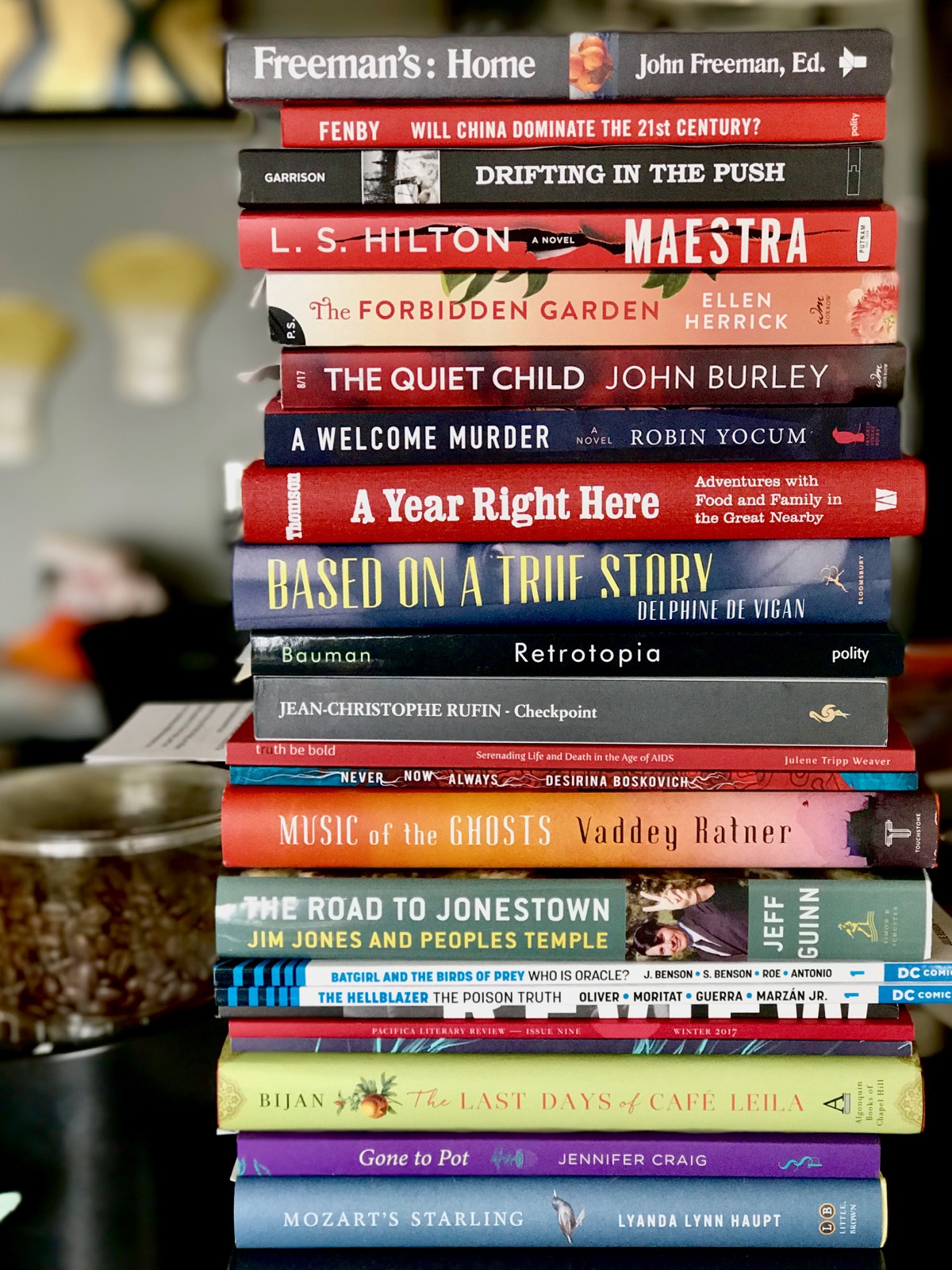Today in opportunities: Get a project-based grant or work for University of Washington Press
The Artist Trust Grants for Artist Projects (also known as "GAP grants," even though the "G" in "GAP" already stands for "grants") opened for applications yesterday. These are "for artist-generated projects, which can include (but are not limited to) the development, completion or presentation of new work in any discipline." That means if you have a project you've been dreaming of doing, Artist Trust wants to give you $1500 dollars to do it. And they're giving out 60 of them. So go fill out a form and get your cash. You have until May 15th, but don't wait until the last minute.
University of Washington Press is hiring an editorial assistant. You have until April 3rd to apply for this one.
Literary Event of the Week: The last APRIL Festival

Maybe you’ve never been to an APRIL Festival before. Maybe you’re new to town. Maybe it just didn’t sound like your thing — maybe you don’t like bars, or maybe you’re nervous about going to readings. That’s okay. I’m not going to slather you with wistful sentimentality talking about what APRIL — the name stands for Authors, Publishers, and Readers of Indepdenent Literature – has meant to the city, or what it’s meant to me, in its five years as a literary festival in Seattle.
But I am going to tell you that this Saturday, April 1st is the very last APRIL Festival. And attendance, this time around, is mandatory. Sure, maybe you work that day, or maybe you’ve got brunch plans. That’s okay. The festival stretches from noon to midnight; surely you can carve some time out somewhere in there. It’s going to take place at Hugo House on First Hill, and it’s free. It couldn’t be any easier to attend.
Most of the day will be made up of APRIL’s book expo, a marketplace of independent presses, where publishers sell their books directly to you. For the day, it will be the largest indie-only bookstore in the Pacific Northwest — maybe the whole country or the world. Bring some cash, though just about everybody has Square nowadays and can process your credit cards. During the Expo, local authors like Quenton Baker, Sarah Galvin, Matthew Simmons, and Elissa Washuta — APRIL veterans all — will read. The scientific poetry brigade Vis-à-Vis Society will be around doing social poetic experiments (kind of like Mad Libs, only with bar graphs) on guests.
Then there’s what APRIL is calling a “very special dinner reading with Jayinee Basu, Tommy Pico and Anastacia Renee Tolbert,” followed by the festival’s long-running competitive storytelling event “A Poet, a Playwright, a Novelist, and a Drag Queen,” which is exactly as it sounds, and a huge dance party to cap off the night, and the festival.
So. What’s this got to do with you, a person who’s never before attended an APRIL? Well, as I said, it’s the last one, so you get future bragging rights to say you were there when the whole thing came to an end. And the APRIL organizers, all of whom are still going to be involved with Seattle’s literary community as writers and fans, really know how to put a fun, surprising event together. I guarantee you’ll see something you’ve never before seen at a reading. And hopefully it’ll inspire you to put together a festival of your own.
But there’s more going on than just a huge, fun party. Listen: the thing is that Seattle’s literary community is poised at a moment of tremendous change. The huge collection of zines and minicomics once held by the Zine Archive and Publishing Project is about to go to the Seattle Public Library. Elissa Washuta and poet Jane Wong are about to leave town to pursue academic careers. Poets Maged Zaher and Michelle Peñaloza just moved away. Local bookstores Zanadu Comics, Wide World Books & Maps, and Lem’s Life Enrichment Bookstore are all considering paths forward, as a second Amazon Books is set to open in Bellevue.
My point is this: We are living in a Moment. Not necessarily a good Moment or a bad Moment, but most definitely a Moment. Things in Seattle’s literary community are about to change. And this party is your opportunity to enjoy the Moment as it happens, to peek around the corner, and to find your place in the Brave New Bookish Seattle that lies ahead.
Make Asgard Great Again
Neil Gaiman's sold-out reading at Benaroya Hall is this Sunday. Over at the San Diego Tribune, he talks about his new book, Norse Mythology, which retells Norse myths in more modern prose. Here he talks about a story in which the leader of the gods leads a crusade against foreigners:
I remember being in New York the other day and reading it in the town hall and when I got to the point where Odin says, “We’re going to build a wall,” the entire hall erupted. And I thought, “Well, there you go. These stories may be old, but they are definitely relevant.”
Don't forget that this Saturday, from noon to 4 pm, the APRIL Book Fair is happening at Hugo House. 27 local publishers — including the Seattle Review of Books — will have tables full of merchandise for sale. Find a full list of vendors right here.
All I'm saying is this: if you're on a budget, and you're thinking about hitting the bars on a weeknight this week, maybe stay home and invest in some literature this weekend. You'll thank me later.
Land Mine
I like a little violence
in my poetry
because I don’t trust
the sweetness
of too-ripe words, like
I don’t trust a man
who says, “you’re wonderful”
too quickly.
What would he say
if I told him the sugar
on his tongue
is only what I allow him
to taste?I used to preen
when a lover called me
easygoing, as if
being no trouble at all
was some kind of glory,
as if un-troubling
his waters would keep
the current from pulling
me under, kicking
the wind out,
from filling my lungs
with salt water
and sorrow.This is how a woman
protects herself,
with yes and sure
and I don’t care,
how she paves every pothole
so others wont need
to remember how much
earth is still root, crack
and resistance,
so others wont feel
the quaking and know
that earth never intended
to be tamed.But I can’t take all
the blame. You see,
they never looked up.
Not once.
Never saw the sentry
in the tree
three clicks up the road
or the sniper on the rooftop
trained to kill
any me that didn’t heel
quick enough. Now,
when a man calls
me easygoing
I land mine,explode his body
into pieces I salvage
for my tricked-out ride,
cruise down main street.
Hydraulics at my fingertips.
My fingers itch
when I hear the engine growl,
“I would have loved you
anyway. I would have
loved you more.”
High concept SF that delivers
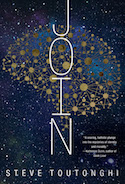
Sponsor Steve Toutonghi's debut novel Join has just come out in paperback. It's the rarest of SF novels: a gripping concept delivered with compelling page-turning intensity. In the world of the novel, many people can join minds to become a single person. We've got the first full chapter on our sponsor's page, so you can see how Toutonghi deftly weaves this high-concept idea into a great story.
The story follows Chance, a person made of many other people, all living seamlessly as a single entity. But one of Chance's nodes is sick, and in learning how to deal with this, Chance has to confront some uncomfortable realities.
Sponsors like Steve Toutonghi make the Seattle Review of Books possible. Did you know you could sponsor us, as well? Get your stories, or novel, or event in front of our passionate audience. We're booked until May, but have some dates through July open for you to pick the best time. Take a glance at our sponsorship information page for dates and details.
Reminder: You have a week and a half to prepare for the next Reading Through It book club
On Wednesday, April 5th at 7 pm, join the Seattle Review of Books and the Seattle Weekly at Third Place Books Seward Park for the latest edition of Reading Through It, our post-Trump book club that examines American issues.
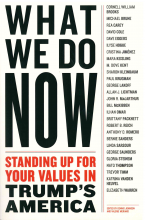
This month, we're discussing What We Do Now: Standing Up for Your Values in Trump's America, a collection of essays published on the occasion of Donald Trump's inauguration. No purchase is necessary to attend the book club, but the book is 20% off right now at Third Place Books Seward Park.
Please feel free to sign on to the Facebook event for the book club, and join the Reading Through It Facebook group if you're so inclined.
We'll see you on April 5th.
Talking with ZAPP's Graham Isaac and Emily Cabaniss about the future of zine culture in Seattle
Last week was awfully long for Zine Archive and Publishing Project (ZAPP) managing director Graham Isaac and ZAPP volunteer operations coordinator Emily Cabaniss. On Monday night, the Seattle Review of Books published the news that Hugo House was donating ZAPP’s extensive collection — tens of thousands of zines collected over almost two decades at their headquarters in the Hugo House — to Seattle Public Library. On Tuesday, ZAPP published a statement saying that “we did not give up the archive, it was taken from us.” On Wednesday, I talked with Hugo House executive director Tree Swenson and SPL spokesperson Andra Addison about the move. By the time they met with me on Thursday afternoon, Isaac and Cabaniss looked pretty tired (“I’m exhausted,” Isaac wrote on Facebook earlier in the week.) But as they huddled over their coffees, Cabaniss and Isaac perked up when they talked about making zines. They’re clearly true believers in the DIY literature community, with a bottomless enthusiasm for self-expression. What follows is a lightly edited transcript of our conversation.
How did you come to be involved with ZAPP?
Graham Isaac: I got involved with ZAPP in 2009 as a volunteer, and then I was communications intern from 2010 through 2011. I stepped away for a few years, just volunteering at occasional events. Then I started getting back involved as a volunteer in 2013, when ZAPP left Hugo House. I was mainly doing things like press releases and whatnot, and then I stepped in as managing director in early 2015.
Emily Cabaniss: I came to ZAPP in December of 2014. First I was doing social media stuff. I have experience doing social media exhibits, so I did Tumblr exhibits for ZAPP.
That kind of morphed into being an extra set of hands for ZAPP. Then in early 2015, when Graham became the managing director, I took on a more active role doing ZAPP's budgets, representing ZAPP to our sponsor Shunpike, and planning meetings, strategies, delegation — a lot of stuff like that.
The way we present literature by default can be really disempowering to readers. It can make them feel like they’re just consumers.
When ZAPP first untethered from Hugo House and it was floating in limbo, what was your vision for it?
GI: At that point I was largely involved as an extra set of hands, but I think for everyone I talked to, and for everyone who has been involved, the dream vision has always been an independent space where ZAPP could run programming, have the entire archive accessible, and grow the archive. The goal since untethering has always been to find a space where ZAPP could be ZAPP, so to speak.
EC: One of ZAPP's main values is radical accessibility. When we talk about the archive we also want to talk about the publishing component, and I think we intended the collection to be not really a special collection whose main priority was preservation, but instead to be this springboard for continued creativity. Be a way to preserve the voices of people who had made zines, but also show people that anyone's voice anyone can make a zine.
It boiled down to “read a zine, make a zine.” The idea was that you could make a zine and put it right in ZAPP. You could shelve it yourself.
This is a super-elementary question, but I actually don't think I've addressed this in my coverage so far, and it's really important for people who are just now hearing about ZAPP: Why are zines still relevant for you in 2017?
GI: There's a lot of reasons. I think for one, just the physical act of making something can be very powerful. Even if you [create] it on a computer but staple it yourself, you have a connection to the work that's really awesome.
I also think that as we're seeing more and more top-down arts organizations suffer and as we're seeing more and more surveillance of the internet and whatnot, the idea of something that is wholly independent is valuable. It doesn't have to go through various processes. This is important. But other things are important too, but this is important.
EC: When I think about zines, I think about the way that we're introduced to the literary tradition in school — the way we are given these books and are told, "these are the great books; you must read them." But there is not really that connection of “how did someone get to write great books? How did someone get their voice?" How does that happen?
The way we present literature by default can be really disempowering to readers. It can make them feel like they're just consumers. Zines to me are a way to short-circuit that process. To give people the power to make and create whatever they want. To make them feel like what they make has value, and to let their voices be heard and read and seen, unfettered by a publishing process.
GI: It's also just really satisfying.
EC: It's fun, yeah.
GI: Once you've made it and it's done and you look at it, it just feels great. Not to necessarily sound all, like, “woohoo!” about it, but just spreading that feeling and making it accessible and low-barrier has been very important.
You've issued your statement. It seems as though the collection is in the hands of, or is about to be in the hands of, Seattle Public Library. I mean, it's physically in their hands, but the custody rights may not officially be there. But it's almost there. It's very confusing.
GI: At this point, all the communication that we've received from Tree and the library indicated that any sort of final signatures were a mere formality. So, we have to operate with the assumption that it is going to the library and that it is a done deal.
It's a really tough time for you and I'm sorry about what happened. You've put a lot of work into this over the years. I want to know if there's anything you wanted to say to the community and the donors who've supported you over the years?
GI: Well, I think first off, just: thank you for that support, and for being there for us, and letting us do our best to be there for you. Also, we wanted to let people know that the way that this transpired was not the way we would have chosen. We recognize that many people who donated zines, time, and energy over the years have done so with the goal of a fully independent and sustainable ZAPP. And that's why we wanted to make sure people knew the details of the transaction.
EC: Yeah, we'd say thank you for your love, and it's been a really great experience to read all the memories that people have of ZAPP on social media — their Facebook comments and their articles. It makes me feel like this is not the end.
I would say to them: zines don't die. ZAPP closes, but you don't stop making zines, you don't stop being this person. So many people have said that ZAPP, and their experience of ZAPP, was this thing that made them the person that they are. I want to say to everyone who had an experience like that: go out and be the person that you are because of ZAPP. That's ZAPP's legacy.
GI: There are so many communities and projects that grew out of ZAPP over the years, and I think those will carry on regardless. I think that larger community is still going to be there, and I think that's excellent.
So, it sounds like we're on the “what's next” portion of the conversation. First I wanted to ask, what do you see your connection to this community being going forward? And then, what in would you, personally, like to do next?
GI: If I can bring back to ZAPP first, for a second: I think the one thing I want to say is I am glad at least, that we can pay it forward a little bit to things, places like Hollow Earth Radio, Short Run Festival, and IPRC. Those are examples of the communities I was talking about.
For myself, I'm going to work on some of my own art now, and try and engage with the community just as a member, as a listener, as a reader, as an artist. I'm not really trying to start any new nonprofits for a little while, you know?
EC: All of this work has been hugely educational for me personally. I'm grateful for that, because I'm a different person — hopefully a better person — now because of it.
I think kind of the same thing. I don't really want to start any nonprofits. I do want to put what I learned at ZAPP to work for other organizations. But I don't know. I think I need a break.
I really didn't have any connection with the community before I started with ZAPP. I'm a librarian, that's my job. And that was the route that I came to zines: someone I knew said, "You're a librarian, you want to talk about zines?"
Now, I know more people in the community, and I want to do more listening and I want to do more learning. We made something, and I want to keep making stuff. And I want to be an advocate for zines to people that I know.
GI: I definitely put some of my own writing and artistic projects on hold during this. I want to get back to some of that. You know, go make a zine.
The Sunday Post for March 26, 2017
Each week, the Sunday Post highlights a few articles good for slow consumption over a cup of coffee (or tea, if that's your pleasure). Settle in for a while; we saved you a seat. You can also look through the archives.
Trump the Destroyer
Olivia Nuzzi published a long and detailed profile of Kellyanne Conway this week. It’s a can’t-look-away article, somewhere between trainwreck and victory march. (Side note: Like a lot of other people, I’m pretty sure I could manage to dislike Conway in person. Her particular brand of fact-bending makes my teeth itch.)
You should read the profile, which is crazy fascinating, but then follow up with this awesomely sardonic essay by Matt Taibbi on how neatly we’ve been suckered into co-creating, with Trump, a “WWE future where government is a for-profit television program.” Ahem.
Trump leans over and pauses to soak in the love, his trademark red tie hanging like the tongue of a sled dog. Finally he turns and flashes a triumphant thumbs-up. A chant breaks out:
"U-S-A! U-S-A! U-S-A!"
Reporters stare at one another in shock. They were mute bystanders seconds ago; now they're the 1980 Soviet hockey team. One turns to a colleague and silently mouths: "U-S-A? What the f ... "
Inhaling Life With Jim Harrison
A friendship forged in the kitchen — superstar chef Mario Batali on eating and cooking with superstar writer Jim Harrison. Would love to have been at a quiet corner table to observe these giants at dinner.
We once shared a slightly overlong supper at the Michelin three-star restaurant Eleven Madison Park, in New York, where he fidgeted through most of the complex meal, announcing early on in his loud baritone to the entire dining room, “Maaaario, you know I am much more of a trattoria kind of guy,” and finally sending his chicken back to the kitchen, because the chef had somehow denied him “THE FUCKING LEGS . . . where are THE FUCKING LEGS . . . ?”
Chasing the First Arcade Easter Egg
Game designer/developer Ed Fries went searching for the ultimate Easter egg: an inside joke hidden so deeply in a vintage game that even its creator had forgotten how to trigger it. Fries scoured code, jury-built an emulator, and rebuilt a classic arcade machine to find it. (via Ars Technica)
I was kind of stunned. If this was true it would certainly predate the earliest video game Easter egg that I knew of and the one that is most often cited as being the first: “Adventure” for the Atari 2600 from 1979. I did a little searching online and found that there was an even earlier Easter egg in the game “Video Whizball” which was released in 1978 for the Fairchild Channel F game console.
But there was a problem. Ron didn’t remember exactly how to bring up the Easter egg. He remembered showing it off to some buddies at a county fair when the game first came out, but that was 40 years ago!
Inside the Hunt for Russia’s Most Notorious Hacker
Malware is sort of like an Easter egg — if you cracked open the pastel treat and found a rotting yolk that emptied your bank account electronically. Or, in this case, helped tilt an election and change the shape of a country.
Garrett Graff traces the hunt for Evgeniy Mikhailovich Bogachev, or “Slavik,” the malware artist who designed the “the Microsoft Office of online fraud.” Great story of a breathtaking cat-and-mouse battle between Slavik and the investigators that tracked the elusive hacker from petty online theft to potentially influencing the US presidential outcome.
[Tillman] Werner, as it happened, knew quite a bit about Evgeniy Bogachev. He knew in precise, technical detail how Bogachev had managed to loot and terrorize the world’s financial systems with impunity for years. He knew what it was like to do battle with him.
But Werner had no idea what role Bogachev might have played in the US election hack. Bogachev wasn’t like the other targets—he was a bank robber. Maybe the most prolific bank robber in the world.
Seattle Writing Prompts: The Capitol Hill Radio Antennas
Seattle Writing Prompts are intended to spark ideas for your writing, based on locations and stories of Seattle. Write something inspired by a prompt? Send it to us! We're looking to publish writing sparked by prompts.
Also, how are we doing? Are writing prompts useful to you? Could we be doing better? Reach out if you have ideas or feedback. We'd love to hear.

Oh, those blinking sentinels. I guess I could have written this about the towers on top of Queen Anne, but there's something about the way these three sisters are clustered together atop Capitol Hill, just off Madison, straddling 17th, two on the West, one to the East.
The three towers belong to: Q13 (or rather, it's parent company Tribune Broadcasting), KCTS, and a company called American Tower that specializes in radio and communication towers. They are, all three, about 410 feet tall, and the ground they sit on is some 560 feet above sea level, so next time you walk all the way up Madison from downtown, you can make sure your Fitbit is counting those stair flights correctly.
There's something so evocative about towers. One time, I drove across the University Bridge, southbound, on a nice Fall morning. I failed to look up at the electrical towers that stand next to the bridge, impossibly tall, because traffic was bad enough, or I was focused enough on my destination.
What I missed by looking up was a trans woman named Ara Tripp who had climbed one of those towers to the top, stripped topless, and spit fire into the morning air as a way to protest the fact that men could walk around topless but women couldn't.
Sadder stories have happened on these towers — suicides and accidents, but a tower always gives a promise. A promise of being able to climb and gain a vista, of a blinking light that might extinguish and cause a plane to immediately impale itself, of surging watts of transmission power, sending media wirelessly to radios and televisions that can receive it.
In Seattle, we have so many of these tall towers because our electronic transmissions need to penetrate the valleys and hills, to get signal to the highest amount of people. As anybody living on the base of Queen Anne or Capitol Hills knows, the landscape throws a shadow of ill reception to those at the bottom who must rely on cable or suffer with poor picture.
But let's think of these a bit more magically, yes? For today's prompts, lets try to unlock something bigger and more fantastical.
Today's prompts
The pattern was unmistakable. The Earth people, with these three towers, were clearly signaling. It took a year of their time for the full cycle to emerge, and at first it seemed almost random. But after parking a ship disguised as one of the primitive Earth satellites to observe, they were quite sure there was no way this could be accidental. So now, finally, they were ready to deliver exactly what the Earth people had so clearly asked for, exactly as they asked for it. They only hoped Earth people truly understood their ask.
It was on. The course was to circle each tower on Queen Anne, then over to Capitol Hill to circle all three, and back to land on the roof deck in Lake Union before anybody could track where the bladedrones were coming from. Fastest racer took the pot, and with twenty entrants, the pot was pretty damn big. It wasn't technically illegal to do this, but only because these specific types of drones hadn't been outlawed yet. They were pushing them to the limits of their range, but surely, nothing would go wrong, would it?
The big house under the towers was always dark. She had blotted out the windows. She had stapled chicken wire to every surface, and grounded it to a pole she dug through the concrete foundation and earthed to pull the signals out of the air. But still, the signals came. She couldn't leave the house, not that she hadn't tried. And she couldn't blot out the signals. It wasn't until she started meditating, being still, and letting the painful signals course her body that she finally understood what they were trying to tell her.
And so through the destroyed city the couple went, down to their last few cans of food. Watching for the rauben, the cloth wrapped reapers. It was the towers you wanted, so the friendlies had said. The towers had platforms built between them, and on those platforms were the traders. And if the traders liked you, and gave you work, you could live a decent life. Sometimes, they said, the towers vibrated like they were still full of signal. Sometimes, they said, it almost seemed like before the fall had begun.
The blinking lights had always been so comforting to him. He'd hunker down, right up to the cold window in his little closet room, the chair under the door so maybe they couldn't come in. They'd be fighting in the other room, throwing words and smashing things, yelling and blaming and cursing, all drunk and high and whatever, and he would just watch the red light turn on, and off, and on, and off. How could anything be so steady in such an uncertain world? So it went until the one night that was more horrible than all the last, and he found himself floating up to those lights, sitting on top of one, the flashing beam painting his little legs. He had to be dead, right? He had to be a ghost. And now he had a ghost job, up there, to sit on the tower and make sure the world was okay. To stop the world from making more ghosts like him. Maybe he could save every child.
Conservative sci-fi troll Theodore Beale, who seemed dumb a few years ago when he tried to game the Hugo Awards but now appears to have been a tiny droplet in the imbecilic wave of white male entitlement currently cresting in the culture, is back at it. Beale is currently trolling sci-fi superstar John Scalzi by publishing a book with a very similar title and cover to Scalzi's new novel, The Collapsing Empire. Scalzi, as i09's Beth Elderkin notes, is a bestselling author and one of the best-known sci-fi authors in the business. Beale is a jealous little mealworm who has finally resorted to publishing literary mockbusters.
I guess it's true what they say about obsession; it will eat you up from the inside until there's nothing left of you.
The Help Desk: Sometimes, humiliation is a team sport
Every Friday, Cienna Madrid offers solutions to life’s most vexing literary problems. Do you need a book recommendation to send your worst cousin on her birthday? Is it okay to read erotica on public transit? Cienna can help. Send your questions to advice@seattlereviewofbooks.com.
Dear Cienna,
Not so long ago, I went to a reading. It was an author who, back in his prime, used to be a bestseller. I still think of him as a big name. Unfortunately, only three people showed up for the reading. Including me.
He was visibly crestfallen when he went onstage to the loudest applause we could muster, and the Q&A session was brutal. It was so awkward that I haven’t been back to a reading since. Was there any way to defuse the situation, do you think? I just felt so bad for the guy.
Jasmine, Fremont
Dear Jasmine,
You experienced someone else's public humiliation. Author readings are often death by a thousand public humiliations, followed by short Q&A. This isn't a bad thing. I would argue that you shouldn't have done anything to defuse the situation and really, there's nothing you could have done.
Several years ago, a man I was pretty smitten with dedicated a song to me on his local radio show. I don't remember the song – it didn't matter – what mattered was he knew I was listening and he did something that no man had ever done for me before: he gave me a public declaration of affection.
When our odd relationship was on its deathbed and I was locked in a losing battle with myself to prove he had cared about me once, I brought it up to him, this moment that I had cherished for over a year. His response was this: "I never dedicated a song to you, I would never dedicate a song to you, that's psychotic."
Before that moment I did not know you could be physically petrified by humiliation. A friend of mine witnessed that moment – when someone broke off a piece of my heart and chucked it into the trash, and then took a shit on top and lit the whole mess on fire – and her response was this: "Damn, that's raw. Nothing will fix this, in fact alcohol might make it worse, but that's about all I can offer, aside from an alibi if his house gets torched for some reason."
My point is this: the popularity of social media and memoir-writing has left us with a pretty stark dichotomy: people who overshare the highlights of their lives and people who overshare their own bottoming out. Either way, the scenes and emotions are curated for an audience. Much less common is what you witnessed – that raw moment when our carefully curated realities are dickslapped by actual reality and we wish to Jesus Prom King Christ that whatever vengeful god had led us here would just finish the job and swallow us whole.
We need those moments to flex our emotions and remind us that life always what we make it, it isn't good or fair or controllable. The best thing you can be in these instances is an empathetic witness and offer alcohol if the situation calls for it.
Kisses,
Cienna
This morning, Capitol Hill Seattle's Kaylee Osowski reported that the Elliott Bay Book Company's building has found a buyer. According to present Elliott Bay landlord Hunters Capital, the new landlord wants to keep the bookstore as a tenant. They have not yet revealed the identity of the prospective owner, but they call them "local" and "family-owned."
We have every reason to believe those claims: Elliott Bay has a long-term lease for the space, and Hunters Capital specifically sought them out as tenants back when the store was based in Pioneer Square. In a time when no Seattle landmarks are safe from development, Osowski's report leaves me cautiously optimistic.
Portrait Gallery: Elif Batuman
Each week, Christine Marie Larsen creates a new portrait of an author for us. Have any favorites you’d love to see immortalized? Let us know

Friday March 24th: The Idiot Reading
New Yorker writer Elif Batuman has only one other book to her name: a non-fiction account of people who are obsessed with Russian novelists. But her debut novel, The Idiot—about a Harvard freshman in the mid-1990s who falls in with some questionable Eastern European types—is earning praise from all quarters.
Elliott Bay Book Company, 1521 10th Ave, 624-6600, http://elliottbaybook.com . Free. All ages. 7 p.m.
Criminal Fiction: the nerve-jangling opposite of the proverbial funny bone
Every month, Daneet Steffens uncovers the latest goings on in mystery, suspense, and crime fiction. See previous columns on the Criminal Fiction archive page
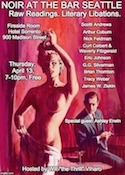
Mark your calendars: Seattle’s free, seasonal Noir at the Bar returns for its Spring edition on April 13. Come for the crime fiction readings, stay for the food, cocktails, and classic ambience!
Reading Around: new titles on the crime fiction scene
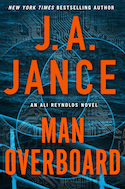
It’s all hands on deck for Ali Reynolds and her High Noon Enterprises cyber-security crew when one Roger McGreary, a childhood friend of Reynold’s colleague Stuart Ramsey, plunges to his death during a cruise. The cyber force is strong in J.A. Jance’s Man Overboard (Touchstone): less of a whodunit or whydunnit — those are relatively early revelations – the entertaining mystery speeds along, helter-skelter, as multiple forensic online investigations proceed. The killer app in this particular tale? A non-human entity rapidly developing its sentient side. Join JA Jance at multiple area events.
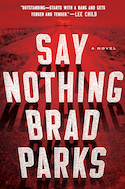
In Say Nothing by Brad Parks (Dutton), Federal Judge Scott Sampson and his wife Alison have been put on serious warning: the novel opens to the dire news that their twins, Sam and Emma, have been kidnapped. To surmise that the judge will do whatever he’s directed by the kidnappers is an understatement — but first he has to figure out which of his cases has caught someone’s criminal eye. In what is a palpably tension-wracked situation, nearly everyone around Scott and Alison falls under their frenzied suspicious — they even eyeball each other. Parks ratchets up and maintains the suspense at a relentless level, so don’t start this one at bedtime.
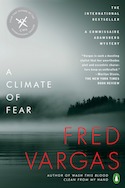
There are some downright bizarre shenanigans afoot in A Climate of Fear by Fred Vargas, translated from the French by Siân Reynolds (Penguin). From a demon being ruling the roost of a tiny and remote Icelandic island, to the Paris-based Association for the Study of the Writings of Maximilien Robespierre — whose members dedicate themselves to re-enacting assemblies from the heady days of the French Revolution and the Reign of Terror — Commissaire Adamsberg has his hands more than full in this police procedural. Part of the pleasure, as always, is reveling in the Adamsberg’s relationship with his crime-fighting colleagues, their eclectic foibles and respect for each other, but the superb cast of colorful non-regulars in Fear, give this latest mystery from the award-winning Vargas distinctly added heft.
Tannie Maria, blissed out by a new romantic relationship, is also suffering from terrifying flashbacks from an abusive one in The Satanic Mechanic by Sally Andrew (Ecco). The death of a land activist kicks off the other plotline in this South African-based cozy crime novel that, at times, feels like it’s been tucked into a recipe book (p.s., the recipes all sound delicious). Even though the mystery bit gets a tad lost in the descriptions of the surrounding trees, birds and wildlife, this friendly novel is something to savor nevertheless, especially in its assertion that there’s not much in life that the love of a little lamb, stalwart friendships, intimate relationships and several slices of the tantalizingly-titled Venus Cake can’t cure. And, for those who like to live a bit more on the edge, Andrew offers up the most beset-upon therapy group since Rachel Samstat’s in Nora Ephron’s Heartburn.
The Quintessential Interview: Chevy Stevens
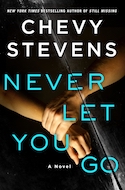
Chevy Stevens has been writing seriously chilling thrillers since 2010’s harrowing Still Missing, and Never Let You Go, her sixth novel, is no exception, delving deep into the sometimes deadly obsessions that lurk in the most intimate of relationships. If there is a nerve-jangling counterpart of the oft-touted proverbial funny-bone, Stevens's aim, in that regard, is unswaveringly true.
Stevens who grew up in Shawnigan Lake, still lives on Vancouver Island, in the city of Nanaimo. Watch her locally: Friday March 24 with Ingrid Thoft at Folio: The Seattle Athenaeum; Saturday March 25, at the Kitsap Regional Library; or Sunday March 26, at Bellingham’s Village Books.
What or who are your top five writing inspirations?
Usually it’s my own fears or personal experiences that drive the themes of my writing.
In terms of an overall career, Stephen King has always been a strong inspiration; I connected with his work when I was very young.
My author friends and family keep me going on the tough days.
My editor is brilliant, very encouraging, and also a wife and a mother. I have learned an incredible amount from her.
When I watch something well-written on TV, or read a wonderful book, it sets off a surge of creative excitement in me.
Top five places to write?
This has changed depending on my daughter’s age and current needs. Right now, my main spot is my local coffee shop in my town, where I have become enough of a fixture that I now earn head nods from the group of older men who meet there every day for their coffee and chats.
When not at the coffee shop, I write at home in my office, which was decorated this year, or downstairs at the kitchen table, looking out at the walnut trees in our backyard.
In a pinch, I have taken my laptop out to our travel trailer, and hidden there from the dogs and family.
I’ve written in a lot of hotels over the years and my most favorite is the Hotel Valley Ho in Scottsdale. If you’re going to be writing while on tour, you might as well be looking out at sun and palm trees.
Top five favorite authors?
So hard! I admire and respect many authors, but the ones that first spring to mind are Stephen King, for the reasons I mention above. Also Ed McBain: his characters were always gritty and real. I adored the 87th Precinct novels and read them all. Bryce Courtenay’s book Power of One had an enormous impact on me. Right now I am really enjoying Sarah Turner, who wrote the Unmumsy Mum. She’s very brave in her writing, and relatable. For fantasy, I’m a big Holly Black fan. In particular, her Darkest Part of the Forest was a stand out for me.
Top five tunes to write to?
For some reason, I can only listen to music when I am writing at the coffee shop, but sometimes I will listen to a certain song before I start writing a scene, to get me in the right headspace. Ed Sheeran is lovely, and I also enjoy Passenger – the melodies are relaxing and don’t break my focus. When I want something a little grittier, I play Chris Stapleton or Eric Church. I’ve recently become interested in Lana Del Rey. Her soulful voice and themes of love fit with my current project.
Top five hometown spots?
There is a famous train trestle near the ranch where I grew up. I used to swim in the river far below, or sit on the trestle and think about life.
One of my other favorite swimming spots is farther down the river, where there used to be a provincial campground. I used it as my imaginary commune location for one of my books.
On my mom’s property there is a trail to a lookout and I used to walk there often when I was sad. There is something about heights that puts problems in perspective.
The two local corner stores still bring back lots of memories of being a kid growing up in Shawnigan Lake, going for ice-cream on a hot summer day, then hanging out at the beach with my friends. Bits and pieces of these areas have made their way into all of my books.
Book News Roundup: The APRIL farewell tour begins this week
- I'm quoted in this very good short sendoff for the APRIL Festival in this month's Seattle Met, by Darren Davis:
The party may be ending this year with a send-off event, but it leaves having made its mark on the local literary scene. “APRIL took readings out of bookstores and into bars, onto the street,” says Paul Constant of The Seattle Review of Books, who started noticing younger crowds at readings after 2012.
Blogging service Medium announced yesterday that they're going to start selling memberships for $5 per month. A whole lot of blogs that we like, including The Awl and Electric Literature, moved over to Medium last year. Then, Medium laid off a bunch of employees. Hopefully, they'll figure this out, because there aren't very many blogging options available to people anymore. I remain skeptical that a subscription, which offers "exclusive stories" and an "offline reading list," is going to be lucrative enough to support the company, but I wish them luck.
The latest issue of Evidence Based Library and Information Practice features an article titled "A Comparison of Traditional Book Reviews and Amazon.com Book Reviews of Fiction Using a Content Analysis Approach.” The idea is to determine whether traditional book reviews or Amazon reviews are more helpful for librarians. Here's the conclusion from the abstract:
Although Amazon.com provides multiple reviews of a book on one convenient site, traditional sources of professionally written reviews would most likely save librarians more time in making purchasing decisions, given the higher quality of the review assessment.
- I interviewed former Elizabeth Warren staffer Ganesh Sitaraman at Town Hall last night about his new book The Crisis of the Middle-Class Constitution. Sitaraman is an incredibly smart man who had a lot to say about the history of income equality in this country, and the audience Q&A portion of the evening was fantastic. You should read Sitaraman's book, which will influence political theory for years to come. And if you would like more information before you pick it up, I'd encourage you to read this wonderful Atlantic interview with him.
Thursday Comics Hangover: Queen of the wild frontier
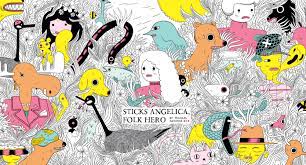
Michael DeForge’s new book Sticks Angelica, Folk Hero begins with all the elements of a classic comic strip. You’ve got the flawed main character, Sticks Angelica, a know-it-all chatterbox who, feeling underappreciated by society, moves to the wilderness to be alone. She fancies herself a survivalist: “I run twenty kilometres every morning. On days I don’t bathe, I rub flowers on my armpits.” And she claims to live the life of a folk hero, wrestling bears when she’s bored and devising homeopathic cures for hangnails.
And then there’s the supporting cast: you’ve got assorted talking animals to keep her company, including a rabbit named Oatmeal who harbors a massive unrequited crush on Sticks. (“How I long to nibble on her earlobe; to eat a carrot out of her hands; to have her carry me into a shared room, which we decorated together.”) Her social circle includes a moose named Lisa Hanawalt who is not to be confused — or, hell, probably she is to be confused — with the cartoonist of the same name. In the background, you’ve got a chorus of simple-minded geese who run around haranguing each other. (“…But we’re geese. Not — not coyotes. Geese are supposed to be Canada’s most trustworthy creatures,” one scolds the other when they accidentally murder a fish. The other replies, “That’s just propaganda from the goose lobby.”)
It even looks like a comic strip collection: Sticks Angelica is laid out in a series of single-page gags, many of which made up of eight panels. For a while, the last panel on every page has a punchline centered around the characters, like, say, Garfield or Dilbert. And unlike those two comics, Sticks Angelica is actually funny.
But then Sticks Angelica starts to deconstruct itself. Sticks violently assaults a nosy reporter, buries him neck-deep in the ground, and leaves him there. That reporter’s name? Michael DeForge. Things get more and more surreal — beyond even the everyday comic-strip surreality of a world with talking animals. A few pages feature recipes for impossible foods like “Classic Monterey Kebab,” which includes a fish scale, a twig, and a precious flower skewered on a stick and heated over flame. We learn about the mating rituals of shape-shifting birds. Visually, DeForge creates whole panels made out of abstract shapes, with non-narrative captions laid over the top. Some of the pages are just tone poems.
Everybody in the book suffers. Sticks Angelica is eaten by bugs: “I’m covered in bites, rashes, sores… even if I wanted to come back to the city, I’m marked.” Michael DeForge is eventually dug up from his hole in the ground, but his body has atrophied to the point where it’s as thin and light as paper, so he floats around like a ghost, haunting the forest animals. A goose is killed by smoke inhalation after it swallows a worm whole and the worm builds a cabin in its gut, which then burns down in a fire.
It’s true that thanks to the deterioration of comics pages in recent years, even strips as banal as Mark Trail have become weirder and more disjointed, but Sticks Angelica is something else again. It’s a newspaper comic strip that has been visited by several Biblical plagues and survived them all out of sheer spite. Everything about the book, from the art to the characters to the plot, is designed to confound its readers’ expectations. It builds comedy out of heartbreak and spins tragedy out of gag strips. Just when you thought you’d seen everything that could be done with eight boxes, a cast of talking animals, and a punchline, along comes a book like Sticks Angelica to remind you that the form can be endlessly refreshed.
Tonight's Lit Fix reading has been canceled
We just received an email from host Mia Lipman that says due to a last-minute emergency, tonight's Lit Fix reading, which I wrote about this morning, has been canceled. Apologies to everyone.
Your Week in Readings: The best literary events from March 22nd - March 28th
Wednesday March 22nd: Lit Fix 4th Anniversary
See our Event of the Week column for more details. Chop Suey, 1325 E. Madison St., 324-8005, http://chopsuey.com. Free. 21+. 7 p.m.
Alternate Wednesday March 22nd: A Constitution for Economic Equality Reading
Law professor Ganesh Sitaraman has long advised Senator Elizabeth Warren on economic matters, making him a leading voice in the battle against economic inequality. Tonight, I’ll be in conversation with Sitaraman about his book, which could very well contain the key for Democratic victory in 2018. Town Hall Seattle, 1119 8th Ave., 652-4255, http://townhallseattle.org. $5. All ages. 7:30 p.m.Thursday March 23rd: The Poetry Brothel
The Poetry Brothel is a touring cabaret featuring musical acts combined with so-called “poetry whores” who will present work onstage and, for a price, join you in a one-on-one private poetry session. Tonight’s performers include burlesque performer Jesse Belle-Jones, magician Josh Lamb, an aerialist named Holly Bordeaux, and house band Good Company. Rendezvous, 2322 2nd Ave., 441-5823, http://thepoetrybrothel.com . $25. 21+. 8:30 p.m.
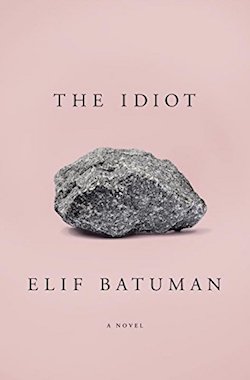
Friday March 24th: The Idiot Reading
New Yorker writer Elif Batuman has only one other book to her name: a non-fiction account of people who are obsessed with Russian novelists. But her debut novel, The Idiot—about a Harvard freshman in the mid-1990s who falls in with some questionable Eastern European types—is earning praise from all quarters. Elliott Bay Book Company, 1521 10th Ave, 624-6600, http://elliottbaybook.com . Free. All ages. 7 p.m.Saturday March 25th: Growing Up in Public Reading
Georgetown’s Fantagraphics Bookstore and Gallery continues its recent trend of bringing international comics greats to Seattle with a rare appearance from Argentinian cartoonist Ezequiel Garcia. Garcia’s memoir, Growing Up in Public, is about life as a cartoonist in a society that continually devalues the importance of the arts. (Take notes, American cartoonists.) Fantagraphics Bookstore & Gallery, 925 E. Pike St., 658-0110, http://fantagraphics.com/flog/bookstore. Free. All ages. 1 p.m.
